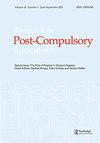神奇的成分:硕士生对论文主题的兴趣
IF 0.9
Q3 EDUCATION & EDUCATIONAL RESEARCH
引用次数: 0
摘要
承认学生兴趣的概念——包括他们可能感兴趣的和他们感兴趣的——在高等教育的新竞争经济中越来越受欢迎。除了促进学生在高等教育机构(HEIs)取得成功的明显好处外,突出学生的兴趣也有公认的教育优势。哲学和心理学文献中有大量合理的解释,说明为什么兴趣对各种学习都如此重要。除了明显的激励效益外,围绕兴趣组织学习有助于教育者实现培养的目标,即全人教育。然而,尽管利用教与学的兴趣具有明显的价值,但缺乏与高等教育机构相关的相关研究。本研究旨在通过调查如何有效地利用学习者的兴趣来指导和监督从事教育硕士学位论文的研究生,从而帮助纠正这种平衡。本文章由计算机程序翻译,如有差异,请以英文原文为准。
The magic ingredient: masters students’ interest in their dissertation topics
ABSTRACT The concept of acknowledging students’ interests – both what they may be interested in and what is in their interest – is gaining increasing purchase in the new competitive economy of higher education. In addition to the obvious benefits of boosting student success in higher education institutions (HEIs), there are well-established educational advantages of foregrounding students’ interests. The philosophical and psychological literature abounds with justificatory explanations of why interest is so crucial to learning of all kinds. Apart from the clear motivational benefits, organising learning around interests helps educators to realise the goal of Bildung, the education of the whole person. However, notwithstanding the obvious value of utilising interest in teaching and learning, there is a dearth of relevant research on the topic of relevance to HEIs. This research aims to help redress the balance by investigating how the interests of learners may be utilised effectively in the guidance and supervision of postgraduate students undertaking masters’ dissertations in education.
求助全文
通过发布文献求助,成功后即可免费获取论文全文。
去求助
来源期刊

Research in Post-Compulsory Education
EDUCATION & EDUCATIONAL RESEARCH-
CiteScore
1.30
自引率
14.30%
发文量
31
期刊介绍:
Throughout the world, there is a growing awareness of the significance of vocational and post-compulsory education and training systems. The majority of countries are working hard to develop their provision, recognising the importance of post-compulsory education in providing educated and skilled people in sufficient numbers at appropriate levels to assist economic and social development. Research in Post-Compulsory Education, sponsored by the United Kingdom"s Further Education Research Association (FERA), recognises the need for more international research and analysis and the generation of relevant theory in order to identify policy needs and trends as well as priorities in this growing area.
 求助内容:
求助内容: 应助结果提醒方式:
应助结果提醒方式:


